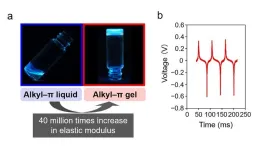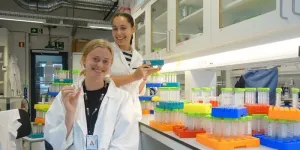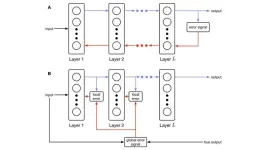(Press-News.org) Scientists have discovered a new cause of why people who lack a specific blood group are genetically predisposed to be overweight or obese.
A team of international researchers, led by the University of Exeter, discovered that people with a genetic variant that disables the SMIM1 gene have higher body weight because they expend less energy when at rest.
SMIM1 was only identified 10 years ago, whilst searching for the gene encoding a specific blood group, known as Vel. One in 5,000 people lack both copies of the gene, making them Vel-negative. The findings from the new research suggest that this group is also more likely to be overweight, a conclusion which could one day lead to new treatments. The team now hopes to test whether a cheaply and widely available drug for thyroid dysfunction may be effective in treating obesity in people who lack both copies of SMIM1.
The study also found that people without both copies of the gene have other measures linked to obesity including high levels of fat in the blood, signs of fat tissue dysfunction, increased liver enzymes as well as lower levels of thyroid hormones.
The new research is published in Med and was funded by the National Institute for Health and Care Research and the British Heart Foundation. The collaboration included partners at the University of Cambridge, the Sanger Institute, the Copenhagen University in Denmark, and the Lund University in Sweden.
Lead author Mattia Frontini, Associate Professor of Cell Biology at the University of Exeter Medical School, said: “Obesity rates have nearly tripled in the past 50 years, and by 2030, more than one billion individuals worldwide are projected to be obese. The associated diseases and complications create significant economic burden on healthcare systems. Obesity is due to an imbalance between energy intake and expenditure, often a complex interplay of lifestyle, environmental, and genetic factors. In a small minority of people, obesity is caused by genetic variants. When this is the case, new treatments can sometimes be found to benefit these people – and we’re now hoping to run a clinical trial to find out whether widely-available drug for thyroid supplementation may be beneficial in treating obesity in people who lack SMIM1.”
“Our findings highlight the need to investigate the genetic cause of obesity, to select the most appropriate and effective treatment, but also to reduce the social stigma associated to it.”
To make the discovery, the team analysed the genetics of nearly 500,000 participants in the UK Biobank cohort, identifying 104 people with the variant that leads to loss of function in the SMIM1 gene (46 females and 44 males). The team also used the NIHR National BioResource to obtain fresh blood samples from both Vel negative and positive individuals. The NIHR National BioResource worked in partnership with NHS Blood and Transplant (NHSBT) – which includes more than 100,000 blood donors who signed up to support genetic research studies. Extrapolating the frequencies identified in these cohorts would mean the SMIM1 variant could be a significant factor contributing to obesity for around 300,000 people across the world.
The team interrogated the effects they found in four additional cohorts of people with the SMIM1 gene variant. They found that having the variant had an impact on weight, equating to an average extra 4.6kg in females and 2.4kg in males.
Co-author Jill Storry, Adjunct Professor at Lund University, Sweden, said: “SMIM1 was only discovered a decade ago, as a long-sought blood group protein on red blood cells, but its other function has remained unknown until now. It’s very exciting to find that it has a more general role in human metabolism.”
Co-author Professor Ole Pedersen, at University of Copenhagen, Denmark, said: “The whole team is very much looking forward to seeing how this new knowledge can be translated into practical solutions for people with this genetic make-up.”
First author Dr Luca Stefanucci, at the University of Cambridge, said: “With the increased availability of genetic data, and more information on SMIM1 mechanism, we would like to see that when individuals lacking SMIM1 are identified, they receive information and support.”
The paper is entitled ‘SMIM1 absence is associated with reduced energy expenditure and excess weight’, and is published in Med.
ENDS
*Labels applied according to the Academy of Medical Sciences press release labelling system
Once published, the research will go live at: 10.1016/j.medj.2024.05.015
About the NHS Blood and Transplant
NHS Blood and Transplant is a joint England and Wales Special Health Authority. We provide the blood, plasma and platelet donation service for England and the organ donation service for the UK. We also provide donated tissues, stem cells and cord blood. NHSBT carries out world leading research and provides a range of advanced clinical services for the healthcare sector. We are an essential part of the NHS, saving and improving lives.
About the University of Exeter
The University of Exeter is a Russell Group university that combines world-class research with high levels of student satisfaction. Exeter has over 30,000 students and sits within the Top 15 universities in The Guardian University Guide 2023, and in the top 150 globally in both the QS World Rankings 2022 and THE World University Rankings 2023. In the 2021 Research Excellence Framework (REF), more than 99% of our research were rated as being of international quality, and our world-leading research impact has grown by 72% since 2014, more than any other Russell Group university.
https://www.exeter.ac.uk/
For further information:
University of Exeter
Press Office
+44 (0)1392 722405 or 722062
pressoffice@exeter.ac.uk
END
New genetic cause of obesity could help guide treatment
Scientists have discovered a new cause of why people who lack a specific blood group are genetically predisposed to be overweight or obese
2024-06-20
ELSE PRESS RELEASES FROM THIS DATE:
Palaeontology: New, small, ancient crocodile-like reptile described in Brazil
2024-06-20
The discovery of a new, ancient, predatory reptile dubbed Parvosuchus aurelioi — part of a group of crocodile-like reptiles called pseudosuchians — in Brazil is described in a paper in Scientific Reports. The specimen, which dates to approximately 237 million years ago, during the Middle-Late Triassic, is the first small predatory reptile of its kind to be found in this country.
Prior to the dominance of the dinosaurs, pseudosuchians were a common form of ancient quadruped reptile during the Triassic Period (252 – 201 million years ago), with some species amongst ...
Prenatal maternal psychological distress during the pandemic and newborn brain development
2024-06-20
About The Study: The findings of this study suggest that increased maternal mental health symptoms during the COVID-19 pandemic are associated with subsequent changes in regional brain growth in newborn offspring.
Corresponding Author: To contact the corresponding author, Nickie Andescavage, M.D., email nniforat@childrensnational.org.
To access the embargoed study: Visit our For The Media website at this link https://media.jamanetwork.com/
(doi:10.1001/jamanetworkopen.2024.17924)
Editor’s Note: Please see the article for additional information, including ...
Healthy lifestyle and the likelihood of becoming a centenarian
2024-06-20
About The Study: In this case-control study of Chinese older adults, adhering to a healthy lifestyle appears to be important even at late ages, suggesting that constructing strategic plans to improve lifestyle behaviors among all older adults may play a key role in promoting healthy aging and longevity.
Corresponding Authors: To contact the corresponding authors, email Xiang Gao, M.D., Ph.D. (xiang_gao@fudan.edu.cn) and Xiaoming Shi, M.D., Ph.D. (shixm@chinacdc.cn).
To access the embargoed study: Visit our For The Media website at this link https://media.jamanetwork.com/
(doi:10.1001/jamanetworkopen.2024.17931)
Editor’s Note: Please see ...
New, simple test detects rare fatal genetic heart condition
2024-06-20
A team of international researchers has revealed a new, simple clinical test to detect Calcium Release Deficiency Syndrome (CRDS), a life-threatening genetic arrhythmia that causes dangerously fast heartbeats and can lead to severe complications such as sudden cardiac arrest and death.
The new diagnostic method monitors for changes in electrocardiography (ECG) after a brief period of a fast heartbeat and a pause, which can occur naturally or be induced by artificially pacing the heart.
This research was co-led by Jason Roberts, a scientist at the Population ...
YALE NEWS: Chemotherapy before surgery benefits some patients with pancreatic cancer
2024-06-20
New Haven, Conn. — Patients with pancreatic cancer who received chemotherapy both before and after surgery experienced longer survival rates than would be expected from surgery followed by chemotherapy, according to a new study from researchers at Yale Cancer Center (YCC) and Yale School of Medicine.
The study, published June 20 in JAMA Oncology, included patients with pancreatic ductal adenocarcinoma (PDAC), which accounts for 90% of pancreatic cancers. An aggressive cancer with a high mortality rate, PDAC is predicted ...
First conclusive evidence that a terrestrial leech species can jump
2024-06-20
A new study presents video evidence that at least one species of terrestrial leech can jump, behavior that scientists have debated for more than a century. Researchers from the American Museum of Natural History, Fordham University, and City University of New York (CUNY)’s Medgar Evers College published the footage and corresponding analysis today in the journal Biotropica.
“We believe this is the first convincing evidence that leeches can jump and do so with visible energy expenditure,” said lead author Mai Fahmy, a visiting scientist at the Museum and a postdoctoral researcher ...
Creation of a power-generating, gel electret-based device
2024-06-20
1. A team of researchers from NIMS, Hokkaido University and Meiji Pharmaceutical University has developed a gel electret capable of stably retaining a large electrostatic charge. The team then combined this gel with highly flexible electrodes to create a sensor capable of perceiving low-frequency vibrations (e.g., vibrations generated by human motion) and converting them into output voltage signals. This device may potentially be used as a wearable healthcare sensor.
2. Interest in the development of soft, lightweight, power-generating materials has been growing in recent years for use in soft electronics designed for various purposes, such as ...
How E. coli defends itself against antibiotics
2024-06-20
When E. coli detects damage to its genetic material, it sends out an SOS signal that alters activity inside the cells.
“The bacteria go into full emergency mode,” says PhD candidate Olaug Elisabeth Torheim Bergum at the Norwegian University of Science and Technology (NTNU).
Imagine that you have a very sore throat. You're sick, your throat hurts, and a visit to the doctor confirms that the pain is due to a bacterial infection. You get a prescription for antibiotics, which quickly sorts out your sore throat. You are pleased that the treatment ...
Mental health leaders to gather for international summit on suicide prevention
2024-06-20
DETROIT (June 20, 2024)— Mental health experts from across the globe will gather to share insights, best practices, and innovations for preventing suicide during the 5th Zero Suicide International Summit June 24-25 in Liverpool, England.
Named for the innovative, evidence-based suicide intervention model developed at Henry Ford Health, the Zero Suicide International Summit is presented by the Detroit-based healthcare system in partnership with Zero Suicide Alliance (ZSA) and The Kevin and Margaret Hines Foundation.
The Zero Suicide model was developed at Henry Ford Health in 2001. Within a year of implementing the ...
Can AI learn like us?
2024-06-20
It reads. It talks. It collates mountains of data and recommends business decisions. Today’s artificial intelligence might seem more human than ever. However, AI still has several critical shortcomings.
“As impressive as ChatGPT and all these current AI technologies are, in terms of interacting with the physical world, they’re still very limited. Even in things they do, like solve math problems and write essays, they take billions and billions of training examples before they can do them well, " explains Cold Spring Harbor Laboratory (CSHL) NeuroAI Scholar Kyle Daruwalla.
Daruwalla ...
LAST 30 PRESS RELEASES:
Novel structural insights into Phytophthora effectors challenge long-held assumptions in plant pathology
Q&A: Researchers discuss potential solutions for the feedback loop affecting scientific publishing
A new ecological model highlights how fluctuating environments push microbes to work together
Chapman University researcher warns of structural risks at Grand Renaissance Dam putting property and lives in danger
Courtship is complicated, even in fruit flies
Columbia announces ARPA-H contract to advance science of healthy aging
New NYUAD study reveals hidden stress facing coral reef fish in the Arabian Gulf
36 months later: Distance learning in the wake of COVID-19
Blaming beavers for flood damage is bad policy and bad science, Concordia research shows
The new ‘forever’ contaminant? SFU study raises alarm on marine fiberglass pollution
Shorter early-life telomere length as a predictor of survival
Why do female caribou have antlers?
How studying yeast in the gut could lead to new, better drugs
Chemists thought phosphorus had shown all its cards. It surprised them with a new move
A feedback loop of rising submissions and overburdened peer reviewers threatens the peer review system of the scientific literature
Rediscovered music may never sound the same twice, according to new Surrey study
Ochsner Baton Rouge expands specialty physicians and providers at area clinics and O’Neal hospital
New strategies aim at HIV’s last strongholds
Ambitious climate policy ensures reduction of CO2 emissions
Frontiers in Science Deep Dive webinar series: How bacteria can reclaim lost energy, nutrients, and clean water from wastewater
UMaine researcher develops model to protect freshwater fish worldwide from extinction
Illinois and UChicago physicists develop a new method to measure the expansion rate of the universe
Pathway to residency program helps kids and the pediatrician shortage
How the color of a theater affects sound perception
Ensuring smartphones have not been tampered with
Overdiagnosis of papillary thyroid cancer
Association of dual eligibility and medicare type with quality of postacute care after stroke
Shine a light, build a crystal
AI-powered platform accelerates discovery of new mRNA delivery materials
Quantum effect could power the next generation of battery-free devices
[Press-News.org] New genetic cause of obesity could help guide treatmentScientists have discovered a new cause of why people who lack a specific blood group are genetically predisposed to be overweight or obese



